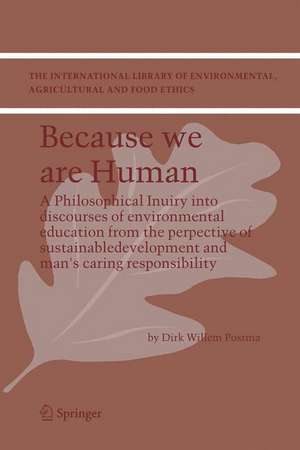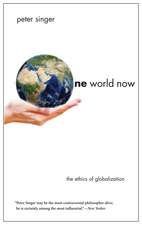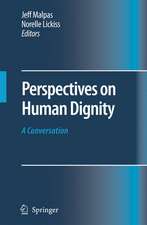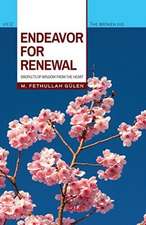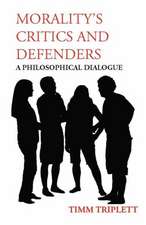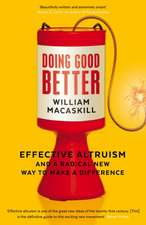Why care for Nature?: In search of an ethical framework for environmental responsibility and education: The International Library of Environmental, Agricultural and Food Ethics, cartea 9
Autor Dirk Willem Postmaen Limba Engleză Hardback – 27 oct 2006
| Toate formatele și edițiile | Preț | Express |
|---|---|---|
| Paperback (1) | 637.28 lei 6-8 săpt. | |
| SPRINGER NETHERLANDS – 19 noi 2010 | 637.28 lei 6-8 săpt. | |
| Hardback (1) | 643.84 lei 6-8 săpt. | |
| SPRINGER NETHERLANDS – 27 oct 2006 | 643.84 lei 6-8 săpt. |
Din seria The International Library of Environmental, Agricultural and Food Ethics
- 15%
 Preț: 707.96 lei
Preț: 707.96 lei -
 Preț: 451.76 lei
Preț: 451.76 lei - 18%
 Preț: 731.10 lei
Preț: 731.10 lei - 18%
 Preț: 744.53 lei
Preț: 744.53 lei - 18%
 Preț: 899.87 lei
Preț: 899.87 lei - 18%
 Preț: 1831.27 lei
Preț: 1831.27 lei - 15%
 Preț: 644.82 lei
Preț: 644.82 lei - 15%
 Preț: 643.16 lei
Preț: 643.16 lei - 18%
 Preț: 947.04 lei
Preț: 947.04 lei - 18%
 Preț: 953.20 lei
Preț: 953.20 lei - 15%
 Preț: 646.62 lei
Preț: 646.62 lei - 15%
 Preț: 646.75 lei
Preț: 646.75 lei - 18%
 Preț: 1116.40 lei
Preț: 1116.40 lei - 15%
 Preț: 643.99 lei
Preț: 643.99 lei - 18%
 Preț: 953.65 lei
Preț: 953.65 lei - 15%
 Preț: 645.28 lei
Preț: 645.28 lei - 15%
 Preț: 637.28 lei
Preț: 637.28 lei - 18%
 Preț: 786.66 lei
Preț: 786.66 lei - 15%
 Preț: 644.30 lei
Preț: 644.30 lei -
 Preț: 398.74 lei
Preț: 398.74 lei - 18%
 Preț: 902.69 lei
Preț: 902.69 lei - 24%
 Preț: 697.63 lei
Preț: 697.63 lei -
 Preț: 388.52 lei
Preț: 388.52 lei - 20%
 Preț: 570.97 lei
Preț: 570.97 lei - 18%
 Preț: 784.61 lei
Preț: 784.61 lei - 15%
 Preț: 527.79 lei
Preț: 527.79 lei - 24%
 Preț: 635.50 lei
Preț: 635.50 lei - 15%
 Preț: 647.08 lei
Preț: 647.08 lei
Preț: 643.84 lei
Preț vechi: 757.46 lei
-15% Nou
Puncte Express: 966
Preț estimativ în valută:
123.21€ • 127.91$ • 102.74£
123.21€ • 127.91$ • 102.74£
Carte tipărită la comandă
Livrare economică 22 martie-05 aprilie
Preluare comenzi: 021 569.72.76
Specificații
ISBN-13: 9781402050022
ISBN-10: 140205002X
Pagini: 232
Ilustrații: X, 221 p.
Dimensiuni: 155 x 235 x 18 mm
Greutate: 0.51 kg
Ediția:2006
Editura: SPRINGER NETHERLANDS
Colecția Springer
Seria The International Library of Environmental, Agricultural and Food Ethics
Locul publicării:Dordrecht, Netherlands
ISBN-10: 140205002X
Pagini: 232
Ilustrații: X, 221 p.
Dimensiuni: 155 x 235 x 18 mm
Greutate: 0.51 kg
Ediția:2006
Editura: SPRINGER NETHERLANDS
Colecția Springer
Seria The International Library of Environmental, Agricultural and Food Ethics
Locul publicării:Dordrecht, Netherlands
Public țintă
Professional/practitionerCuprins
Because we are citizens.- Because we are human.- Because we educate citizens caring for nature.
Recenzii
From the reviews:
"This fine, timely book by Postma … will appeal to educators and environmentalists seeking to clarify the best available philosophical foundation for reasoning clearly about environmental responsibilities. … Summing Up: Highly recommended. Upper-level undergraduates and above." (S. A. Mason, Choice, Vol. 45 (1), 2007)
"This fine, timely book by Postma … will appeal to educators and environmentalists seeking to clarify the best available philosophical foundation for reasoning clearly about environmental responsibilities. … Summing Up: Highly recommended. Upper-level undergraduates and above." (S. A. Mason, Choice, Vol. 45 (1), 2007)
Textul de pe ultima copertă
What is it that inspires us humans tot take responsibility for our involvement with the natural environment? And how do we familiarise children with practices of environmental responsibility? These questions are at the heart of this book, resulting from a comprehensive inquiry into the ethical and politico-philosophical dimensions of environmental education. Two sources of inspiration and responsibility are discussed in particular. First, as citizens of a civil society, inspiration stems from our commitment to the continuation of the collective practices in which we are already engaged. Second, inspiration emerges from our sensual-aesthetic acquaintanceship with the natural surroundings in the course of our everyday activities. This study concludes that there is insufficient room for these sources of inspiration and responsibility within the prevailing framework of Education for Sustainable Development (ESD). An alternative view on the nature and purpose of environmental education is put forward in light of these shortcomings. This view aims to retrieve an existential human sense of care for our natural environment, beyond the narrowly defined appeals made on behalf of future generations, as well as beyond the romantic appeals made on behalf of the intrinsic sovereignty of nature.
Caracteristici
A rigorous, yet accessible introduction into the current philosophical discourses underpinning practices of environmental education Provides a comprehensive theoretical framework, relating philosophical key issues and educational concerns in an intrinsical manner, against the background of current practices and policies of environmental education Thoroughly interdisciplinary and wide of scope Develops an original argument in favour of an alternative neo-republican and care-ethical notion of environmental responsibility and education. This notion is innovative and original in the sense that it draws on divergent intellectual sources that have never before been combined Reflects on a highly topical subject: the international programs of Education for Sustainable Development (ESD), which dominate at present in all countries who participate in the educational and environmental organisations of the United Nations (who recently declared the upcoming decade of 2005-2015 as the United Nations Decade on Education for Sustainable Development)
